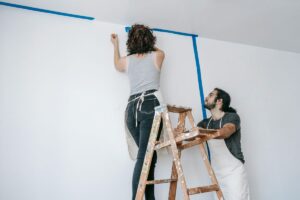A new survey by Luvly, a company focused on skincare and wellness, confirms that many women feel anxious about getting older. They are worried about being accepted by society, feeling lonely, and how aging might affect their relationships.
Societal Expectations

As women age, cultural expectations often lead to feelings of anxiety about being judged or treated differently. These expectations suggest that there’s something wrong with looking ‘old’ or aging naturally.
Mental Health Impact

Our relentless pursuit of youthful perfection often amplifies anxiety, depression, and an overall sense of diminished self-worth. Numerous studies have revealed that unrealistic beauty standards bring about psychological distress among developing women.
Career Challenges

Ageism within the professional world makes women doubt their capabilities and job security. Research has shown that older women encounter discrimination during the hiring process compared to their younger counterparts.
Personal Relationships

As women age, their relationships could become strained as common interests shift or social circles change. According to the Sage Journals, romantic partnerships might be affected by concerns about physical appearance or self-confidence.
Ever-Changing Beauty Standards

Society often promotes unrealistic beauty ideals that equate youth with attractiveness and value. These cultural narratives, promoted by the media and societal expectations, contribute to many women’s fears surrounding aging.
Understanding Different Perspectives

Women from diverse backgrounds and identities face unique challenges and experiences related to aging. Things like race, ethnicity, financial situation, and sexual orientation can intersect with their gender to shape how they feel about getting older.
Health Concerns as We Age

Beyond how society and other people may perceive aging, women may also worry about health issues that can come with getting older. Research shows that age-related illnesses and declining physical abilities could impact their quality of life as they grow older.
Coping Strategies for Women

By sharing their experiences and emotions, women can find comfort, validation, and practical advice for overcoming age-related challenges. Research shows that engaging in self-care practices can promote overall well-being and a positive mindset.
Fostering Personal Growth and Resilience in Later Years

Many women pursue personal development activities to cope with the fears and realities of aging. The National Institutes of Health revealed that exploring new interests, acquiring new skills, or setting personal goals help provide a sense of accomplishment.
Financial Worries

Statistics show that women often make less money than men and get paid less for doing the same jobs. By the time women reach retirement age, they may not have enough savings to support themselves.
Building Bonds Across Generations

A study by Colorado State University shows that having good relationships with people of different ages is essential for women as they age. Older women can share their wisdom and life experiences, and younger people can offer new ideas and perspectives.
Viewpoints on Aging Differ Across Generations

People from different generations often have varying views on growing older, based on several study papers. This generational gap in perspectives can significantly shape women’s experiences and perceptions as they age.
Societal Impressions

The societal perceptions surrounding aging can influence a woman’s sense of self-worth. Data demonstrates that negative stereotypes lower a woman’s confidence and ultimately impact her overall well-being.
Ageism and Sexism: A Double Burden for Aging Women

This double discrimination can lead to marginalization in various aspects of their lives. Older women may find themselves on the receiving end of unfair treatment, biases, and stereotypes.
Effects of Ageism and Sexism

The combination of ageism and sexism can have far-reaching consequences for aging women. In the workplace, they may encounter barriers to career advancement, lower pay, and limited opportunities due to biases against their age and gender.
Cultural Differences

Studies show that cultural perspectives shape how women experience getting older. Some societies embrace aging as a natural part of life, while others view it more negatively. Cultural traditions, values, and beliefs can influence how women perceive growing older.
Media Portrayal

Uplifting TV and radio portrayals can encourage more positive attitudes about growing older among women. On the other hand, if the media reinforces ageist stereotypes or excludes older women, it promotes harmful biases about aging.
Enhancing Wellness Across Life’s Stages

Findings reveal that aging women should adopt healthy lifestyle habits, seek routine medical care, and have a positive mindset about aging.
The Power of Supportive Connections

Cultivating meaningful relationships can act as a cushion against the negative impacts of age-related stressors.
Championing Advocacy and Activism

Recent statistics show that advocacy and activism help promote policies that embrace people of all ages. Women can shatter the barriers of age discrimination by raising their voices and taking action.
The post Embracing Aging: Addressing Women’s Fears and Changing Narratives first appeared on Mama Say What?!
Featured Image Credit: Shutterstock / PeopleImages.com – Yuri A .
Tim Thomas is a renowned writer and entrepreneur specializing in finance, investing, and money matters. With his extensive knowledge and experience in the financial sector, Tim offers valuable insights into the world of personal finance, stock market trends, and investment strategies.





